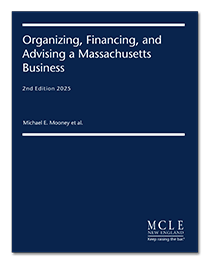Organizing, Financing, and Advising a Massachusetts Business
Practical and current information

- Product Number: 2220268B00
- Publication Date: 1/31/2025
- Edition: 2nd Edition 2025
- Copyright: © 2025 MCLE, Inc.
-
Add to Favorites List
Choose Format:
-
Product Description
Product Description
Organizing, Financing, and Advising a Massachusetts Business addresses a variety of formational, operational, and legal aspects of a Massachusetts business entity, most of which are commonly the province of both in-house counsel and lawyers for corporations. Chapters touch on critical aspects of the choice of entity, taxation, fiduciary duties of officers and directors, allocation of interests, contracting with and compensating employees, real estate and environmental issues, antitrust considerations, the disposition of proprietary property, venture capital, and debt financing, going public, and dissolution. Designed for beginning transactionalists and business generalists, as well as lawyers with some experience tackling legal challenges across an organization's life cycle.
Recent updates:
-
Update: January 2025
Dear Subscriber:
Thank you for choosing to stay current in your practice and research with this 2025 edition of Organizing, Financing, and Advising a Massachusetts Business . Inside, you will find new material on such topics as the following:
- Climate-related risk and the impact on business strategy. See chapter 8 for discussion of the 2024 SEC rule, published in the Federal Register, mandating robust financial and nonfinancial disclosure of climate-related risks in registration statements and annual reports.
- Terms of the employment relationship. Chapter 5 contains a practice note on articulating the essential job functions to be prepared in the event that an employee requests a reasonable accommodation due to a disability, pregnancy, or a sincerely held religious belief.
- Corporate tax lien waiver. Chapter 7 discusses the situation where a corporation or a limited liability company makes an election to be taxed as a corporation in the Commonwealth and the subject of corporate tax lien waivers.
- Contaminated property. See chapter 8 for discussion of contractual obligations with regard to disclosure of contamination, as related to the availability of a third-party defense. The chapter also addresses bona fide prospective purchaser and contiguous property owners' defenses related to the ASTM standard for Phase I reports.
We at MCLE trust that you will find this new material useful in your practice, and valuable in keeping your law library current.
Cordially,
MCLE Press
-
Update: January 2025
-
Table of Contents
Table of Contents
expand allChapter 01 expandChoice of Business Entity: General Strategies
Buy Chapter Chapter 02 expand
Chapter 02 expandTax Aspects of Incorporation
Buy Chapter Chapter 03 expand
Chapter 03 expandFiduciary Duties of Officers, Directors, and Business Owners
Buy Chapter
Exhibit 3A
- Sample Amended and Restated Supplemental Executive Retirement Plan Buy FormChapter 04 expandAllocating Interests in the Corporation
Buy Chapter Chapter 05 expand
Chapter 05 expandEmployment Agreements
Buy Chapter Chapter 06 expand
Chapter 06 expandEquity Incentives for Employees
Buy Chapter Chapter 07 expand
Chapter 07 expandReal Estate Issues
Buy Chapter Chapter 08 expand
Chapter 08 expandEnvironmental Considerations
Buy Chapter Chapter 09 expand
Chapter 09 expandAntitrust Considerations
Buy Chapter
Exhibit 9A
- Primary Sources of U.S. Antitrust Agency Guidance Buy FormChapter 10 expandProtecting Proprietary Information
Buy Chapter Chapter 11 expand
Chapter 11 expandVenture Capital Financing
Buy Chapter Chapter 12 expand
Chapter 12 expandDebt Financing
Buy Chapter Chapter 13 expand
Chapter 13 expandGoing Public
Buy Chapter Chapter 14 expand
Chapter 14 expandLiquidation and Dissolution
Buy Chapter
Exhibit 14A
- Vote of Stockholders Buy FormExhibit 14B
- Secretary’s Certificate Buy FormExhibit 14C
- Articles of Dissolution Buy FormExhibit 14D
- Articles of Revocation of Dissolution Buy FormExhibit 14E
- Application for Reinstatement Following Administrative Dissolution Buy FormExhibit 14F
- Application for Revival Buy FormExhibit 14G
- Form 966: Corporate Dissolution or Liquidation Buy Form - Editors & Authors

